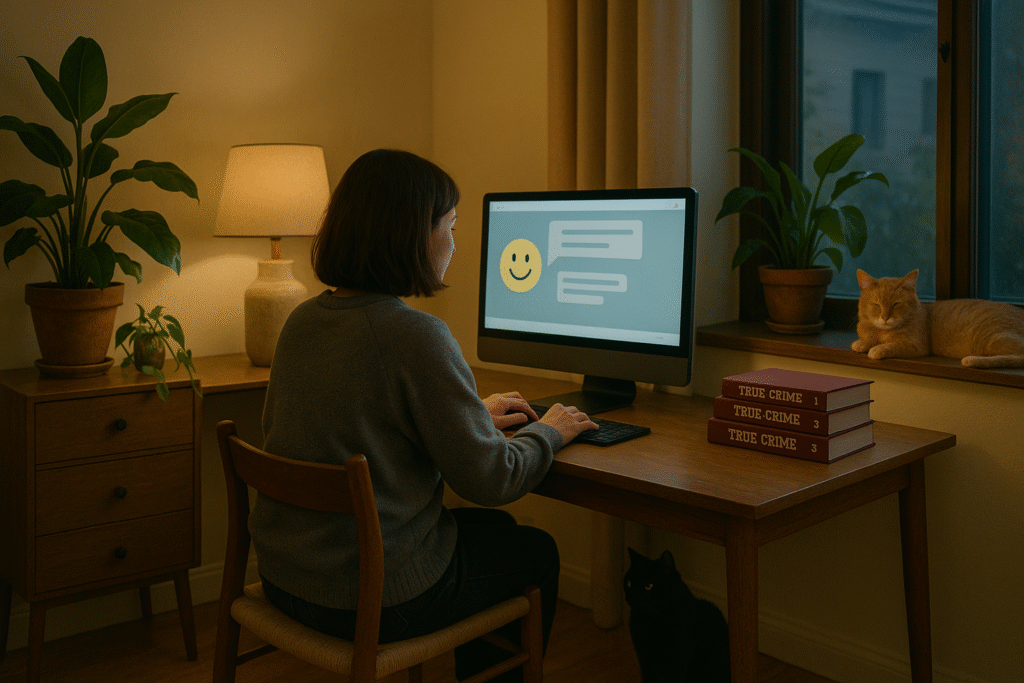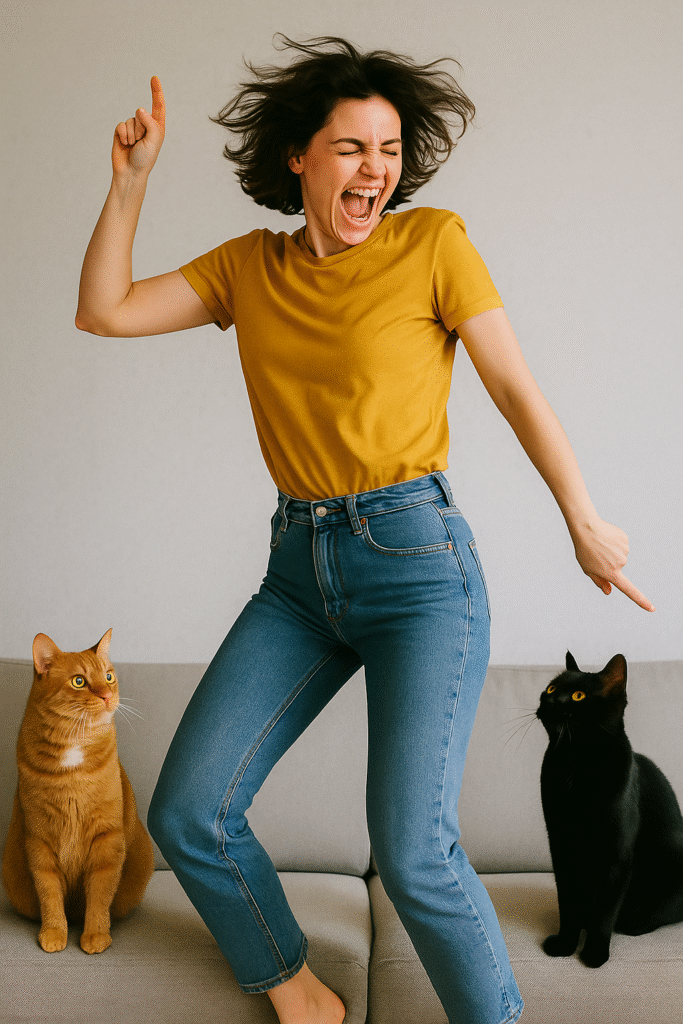
Living with avoidant personality disorder (AvPD) isn’t easy. (Massive understatement.) But we have to make the most out of it.
Over the years, I’ve learnt what type of social situations stress me out, which is most of them! But I’ve realised I can get my social fix (validation?) in certain ways.
We can’t all build lives around dinner parties and shared office jokes (frankly, I suspect most of those social butterflies are just winging it anyway, inwardly cringing and competing for the spotlight, and not having the time of their lives that they are pretending to have) but we can build lives around things that feel bearable and that lessen the pain of having AvPD.
Online Friendships: Connection Without Performance
One of the most important ways I’ve learned to cope – and yes, even connect – is through online friendships. I’ve had a friend since 2019 who I’ve never met in person, but we’re involved in each other’s lives. Even though most of our conversations happen online (and occasionally on the phone), it makes me feel less alone, and on especially difficult days, chatting to my friends online can make me feel better.
This friend doesn’t have AvPD. We met in a forum for people interested in alterative therapies and started to PM each other when an argument blew up between a group of people.
We both quite like a drama and we can be in hysterics with our back and forth emails. I know about her family issues, relationship highs and lows, and that her brother is a bit of a twat. These things make me feel less alone, and without her I don’t know what I’d do. I’ve told her all about my weirdness, but we just get on anyway.
Our emails don’t start with airy-fairy talk about the weather; we just dive straight in with things like, “Has he contacted you yet?” or “Pervy Nigel was peering into my kitchen window again last night. What would you do?” We skip the small talk and get right to the drama – it’s therapeutic and unfiltered, like a friendship built on gossip, survival instincts, and occasional mutual dread.
That’s what making the most out of AvPD can be like: creating closeness in ways that bypass the panic of face-to-face interaction.
In conversations, I need time to process what people are saying before I can reply, and by the time I’ve thought of a response, the other person has already started talking again leaving me hanging.
Lately, I’ve also started looking for online friends who do live with AvPD or similar issues. But, crikey, it is so difficult to find people you get along with. It is for me anyway. Obviously, just because two people have AvPD, doesn’t mean they will get along. I’ll write a post at some stage about my frantic efforts to find friends and the disappointments that come with it.
Putting ourselves out there (with limits) is part of making the most out of AvPD. I believe most of us need someone to share things with.
For years on and off, my limited social life has been built around mental help groups. You know those cafes where you can go for a chat with other people that have mental health stuff going on. But I don’t even fit in with those groups. I’d find myself sat shaking slightly or trying to suppress an onslaught of yawns. I finally realised that these get togethers weren’t for me, even though I know the idea is to make friends and start doing things with them that you enjoy. Say a lairy afternoon down the pub, or a civilised trip to the cinema.
Online groups were a better fit. The MIND charity and others run Zoom sessions where you can chat or just listen. If you’re not connected to your local mental health system, they’re worth looking into. Start with a doctor, or MIND, and see what’s out there. Sometimes a little connection, even through a screen can be a lifeline.
Hobbies: True Crime, Cats And Animals In General
 When you spend most of your life alone, you have plenty of hours to fill. I read a lot of true crime books, especially the ones about serial killers and the psychology behind them. I know it’s dark, but reading about such awful things can leave me hanging, but this time, in a good way. It’s total escapism for me. I also love those true crime docs that come up on Prime video and Netflix.
When you spend most of your life alone, you have plenty of hours to fill. I read a lot of true crime books, especially the ones about serial killers and the psychology behind them. I know it’s dark, but reading about such awful things can leave me hanging, but this time, in a good way. It’s total escapism for me. I also love those true crime docs that come up on Prime video and Netflix.
I have to say though that if I continuously read or watch something (escapism), it makes me depressed, and I’ve learnt that getting back into the real world, doing life admin and hopefully doing something for the future makes me feel better.
I also live with two rescue cats who keep me busy and stressed out (vet bills). I can’t imagine life without them. I must have lost the plot because I’ve been known to dance for them (they look horrified) and we play hide and seek.
Am I the only person who lays flat in the bath, hiding from cats, barely able to contain my giggles?
Still, there are days when doing hobbies in complete silence, with no social interaction, makes me feel really low. That’s when I hit Reddit and Facebook, posting about my woes and replying to other peoples’ posts. I’ve found that the right mix of solitude and connection can keep me afloat.
That, again, is part of making the most out of having AvPD: building something that balances escape with emotional survival.
The Power Of Small Interactions
I’ve finally accepted that I’m not someone who thrives at parties or community groups. I’ve stopped forcing myself to attend social events that only increase my anxiety (although in the back of my mind I sometimes think about creating my own local social group for people with mental health issues).
Sometimes, the smallest interaction can lift my whole day. A word with the postman. Nodding at a neighbor while taking the bins out (just please don’t come over and chat to me – not unless you hang off my every word and adore me and make me feel great, because anything less makes me feel like shit). Giving way to a driver and getting that little thank you wave. These brief, surface level moments don’t ask much from me, but they offer a little spark of connection.
Because my anxiety is sort of backward, I’m actually more comfortable with transactional interactions – appointments, deliveries, that sort of thing. If someone is being paid to talk to me, it oddly gives me confidence. The gardener needs me to pay him. The doctor is paid to listen. That exchange makes me feel less like I’m a burden. Weirdly, hospital visits and dental checkups often cheer me up more than small talk at a party ever could.
Making the most out of AvPD can mean noticing what works for you, and going along with that.
Know What Works. Get Rid Of What Doesn’t.
One of the biggest things I’ve learned is this: you don’t have to live according to anyone else’s social blueprint. You just need to pay attention to what works – and what doesn’t – and make adjustments from there. The difficulty is finding what works for you but with trial and error, you will know.
Making the most out of AvPD – for me – means being honest about my limits, and not forcing myself into a mold that doesn’t fit.
And if you want to work on your social fears, you can. Talk to one new person. Try something small. But sometimes the bravest thing isn’t pushing yourself harder, it’s accepting what doesn’t work and being done with it.
Making The Most Out Of AvPD: Not A Slogan, But A Strategy
I live a reclusive life now, and honestly, it suits me. Not because I don’t long for connection – I do – but because I’ve stopped trying to force the kind of connection that stresses me more than it helps.
There are hard days. There’s loneliness. But there’s also relief in no longer auditioning to be the most likeable or easygoing person in the room. That pressure is gone.
Making the most out of AvPD doesn’t mean pretending it’s a superpower or trying to turn it into something it’s not. It means figuring out how to live alongside it, with compassion, creativity, and honesty. It means building a life that suits your nervous system, your preferences, and your need for peace.
It might not be a conventional life. But it can still be a good one.
I sometimes remind myself that the grass isn’t always greener; all those people with jam packed social lives and endless group chats? They can be just as suicidal, depressed, and hollowed out as the rest of us – they’re just doing it in company. So no, I might not have a bustling social circle, but at least my misery doesn’t come with a side of performative small talk and bottomless mimosas. Alone doesn’t always mean lonely – sometimes it just means you’re not pretending.
 Further Reading And Resources
Further Reading And Resources
Humans need solitude’: How being alone can make you happier – Explores how alone time can be good for you.
Why Some Loners Are So Happy – Discusses research on the positive aspects of being a loner, including mental health benefits.